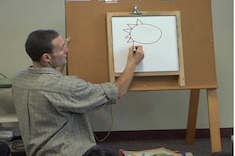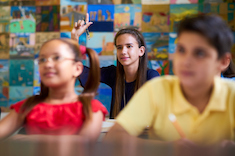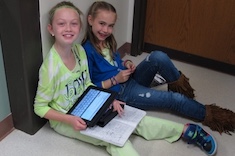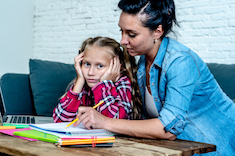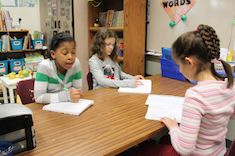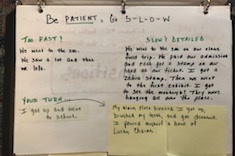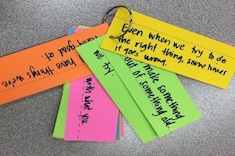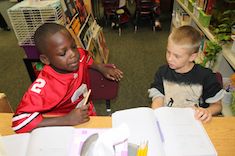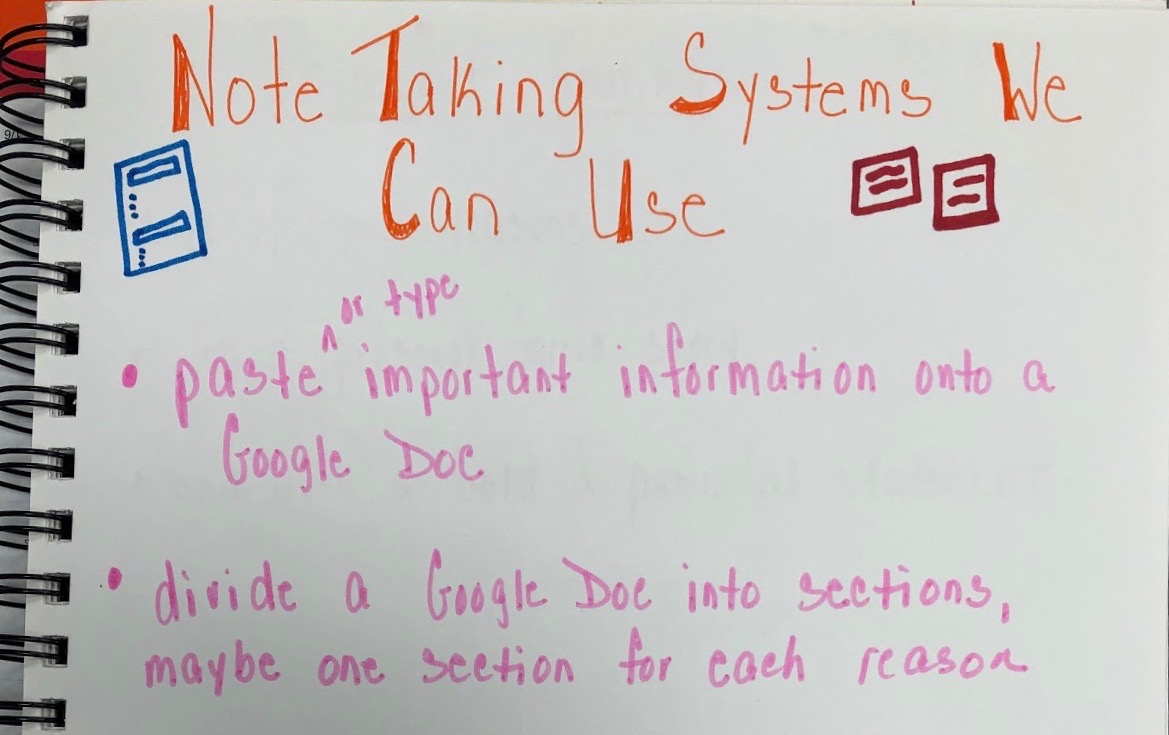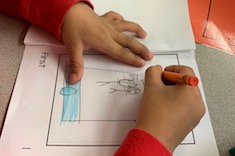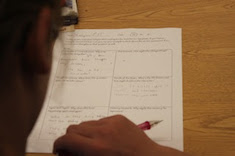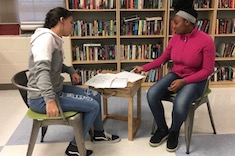Articles
Here is where you’ll find all the latest print features from our contributors. If you’d like to browse specifically by grade level, topic, or contributor, you can use the links in the right sidebar.
Latest Content
Drawing and Learning in Kindergarten
Max Brand demonstrates basic drawing strategies early in the year, and then has his kindergartners attempt similar pictures. He explains how the exercise builds basic skills both in literacy and hand/eye coordination.
No Pictures Stinks!
Shari Frost remembers how she inadvertently stifled the creativity of one of her most enthusiastic first-grade writers. Her story has important lessons for all of us about the importance of voice and choice for learners of all ages.
Status of the Class: Reflecting on Reading Communities
Franki Sibberson uses status of the class each day as a window into her fledgling reading community.
A Better Status of the Class
Dana Murphy finds that adding numbers of pages to her status-of-the-class list for reading makes all the difference in assessing students’ growth and needs as readers.
Linking Literacy and Community at the Start of the Year
Tara Barnett and Kate Mills start with the poem “Where I’m From” to build community through literacy at the start of the year.
Speed Reading
Adolescent learners can face daunting reading loads in high school that they need to tackle at home. Jen Schwanke has tips for how teachers and parents can work together to help teens develop strategies for dealing with a lot of complex reading quickly.
Managing Take-Home Books
Sending books home with young readers is essential. Cathy Mere gives lots of practical tips for designing a take-home books program and communicating with families about what young readers need.
Strategies for Sustaining Student Attention
Jen Schwanke shares some strategies for sustaining student attention beyond just calling out a student’s name over and over and over again.
Forgetting and Remembering
In the end classroom management often comes down to students valuing the same things we do. Jen Schwanke has tips for how high school teachers can create a culture where there is better communication and more shared values.
Setting and Using Classroom Norms
Class promises, rules, and norms—most teachers set them at the start of the year. But how can we make sure students live them? Dana Murphy shares some tips from her fifth-grade classroom.
Homework: I Challenge You!
Heather Fisher helps a first-grade teacher create a homework challenge as a way to make the practice more meaningful and engaging for students and families.
A Homework-Free Classroom
Dana Murphy looks at homework from the twin perspectives of mom and teacher, and finds she hates it from both views.
Guided Reading for Proficient Readers?
Shari Frost is surprised to see guided reading used for proficient fifth-grade readers. She considers some strategic alternatives.
Using a Strategy Notebook in Small-Group Instruction
So many needs for groups, and so little time. Dana Murphy finds that a strategy notebook is invaluable as a teaching aid in her fifth-grade small groups.
Helping Students Develop Conversational Identity
Jen Schwanke writes about the challenges of helping students develop conversational identities, providing prompts to help teachers reflect on their strengths and needs in fostering talk in classrooms.
Growing Talk About Reading
Tara Barnett and Kate Mills find that struggling readers in the early grades benefit from scaffolds and repeated practice in small groups. They share some of their favorite tools, including key ring prompts and anchor charts.
Talking Through Characters
Melanie Meehan shares activities that help students talk about their characters before writing about them in a realistic fiction unit.
Stepping Away from the Conversation
Jennifer Schwanke explains why sometimes the best thing teachers can do to foster better conversations in their classrooms is to step away and let the talk unfold among students.
Summer Literacy
“What can I do to help my son and daughter stay sharp and not lose momentum during the summer?” When a parent asks this question, Mark Levine offers his Top Six Summer Slide Preventers.
Student-Centered Notes
Dana Murphy discovers that what works for one student doesn’t work for another when it comes to note-taking. She provides options and then hosts a gallery walk so everyone can discover what works best for them.
Becoming More Inclusive
Every teacher wants to be more inclusive. But where do you begin? Melanie Meehan presents three practical starting points.
Whose Point of View Matters? Considering Multiple Perspectives
When it comes to including and understanding others, it may be hardest to empathize with those who disrupt or bully others. Tammy Mulligan shares her four favorite mentor texts for understanding students who are angry and lash out.
Spring Cleaning
Jennifer Schwanke shares some quick tips for spring cleaning of classrooms and literacy supplies.
Fewer Books and More Options at the End of the Year
Cathy Mere considers the dilemma teachers face when the bookroom, library, and tech departments require books and devices to be returned late in the year . . . but there are still a few weeks of school. She shares many suggestions for fostering literacy and community when there are far fewer books in the room.
Key Elements of Short Stories
Gretchen Schroeder finds her students’ enthusiasm for writing short stories flags quickly without some instruction and guidance.
Growing Toward Stories
Tara Barnett and Kate Mills use prompts and aids to help their youngest learners tell stories and find a writing voice.
Alternatives to Graphic Organizers
Dana Murphy is dismayed by the ways graphic organizers can sometimes limit student creativity. She uses writing notebooks and a few other strategies to begin to wean her fourth graders from depending too much on organizers.
Writer’s Notebook Tweaks
Gretchen Schroeder analyzes the use of writing notebooks in her classroom, focusing on what’s confusing or frustrating for students. She makes some small changes that yield big results.
Releasing the Teaching to Students
Mark Levine releases responsibility for teaching and assessment to students late in the school year, and hears echoes of learning from previous units.
Who Owns the Learning?
An enthusiastic student response to an author visit inspires Christy Rush Levine to revamp her upcoming unit on craft moves to foster more student ownership.
Browse Content By
Type
Category
- Assessment Tools
- Big Fresh Archives
- Booklists
- Choice Numeracy
- Classroom Design
- Common Core
- Community Building
- Conferring
- Content Literacy
- Digital Literacy
- English Language Learners
- Equity
- Family Relations
- Free Samples
- Guiding Groups
- Leadership
- Literacy Coaches
- Mentor Texts
- Minilessons
- New Teacher Mentors
- Podcasts
- Poetry
- Quote Collections
- Reading Strategies
- Self Care
- Struggling and Striving Learners
- Talking and Listening
- Teacher Study Groups
- Teaching Reading
- Teaching Writing
- Word Study and Vocabulary
Author
- Melissa Quimby
- Nawal Qarooni
- Gwen Blumberg
- Julie Cox
- The Lead Learners
- Hannah Tills
- Josie Stewart
- Ruth Metcalfe
- Mallory Messenger
- Becca Burk
- Jodie Bailey
- Vivian Chen
- Mary Brower
- Tiffany Abbott Fuller
- Stephanie Affinito
- Ruth Ayres
- Leigh Anne Eck
- Heather Fisher
- Shari Frost
- Julie Johnson
- Suzy Kaback
- Gigi McAllister
- Shirl McPhillips
- Melanie Meehan
- Cathy Mere
- Debbie Miller
- Tara Barnett and Kate Mills
- Tammy Mulligan
- Dana Murphy
- Bitsy Parks
- David Pittman
- Brenda Power
- Heather Rader
- Matt Renwick
- Mandy Robek
- Christy Rush-Levine
- Gretchen Schroeder
- Jen Schwanke
- Brian Sepe
- Katherine Sokolowski
- Stella Villalba
- Jennifer Vincent
Grade Level
Choice Literacy Membership
Articles
Get full access to all Choice Literacy article content
Videos
Get full access to all Choice Literacy video content
Courses
Access Choice Literacy course curriculum and training

